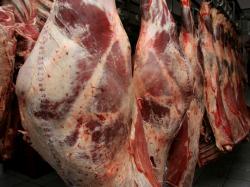Tyson's Dakota City Beef Plant Making Improvements To Increase Efficiencies
March 8, 2012 | 4 min to read

Dakota City, Neb. – As part of an ongoing plan to maximize operational efficiencies, Tyson Fresh Meats, Inc., a subsidiary of Tyson Foods, Inc., is making major improvements to its Dakota City beef plant. The changes are expected to bolster the future of the Dakota City operation but may lead to the closure of the company’s small beef plant in Denison, Iowa. The multi-million dollar project at Dakota City will upgrade or replace parts of the plant that were originally built almost 50 years ago. The improvements will include state-of-the-art processes and technology designed to benefit animal handling, food safety, meat quality and workplace safety.
The Dakota City project, which is already under way, is scheduled to be completed in mid-2013. It includes construction of a new beef slaughter floor that will incorporate the latest sanitation and production systems.
The company is also making improvements to the Dakota City plant’s beef carcass cooler, rendering and box handling operations, as well as employee lockers and cafeteria. Changes in the plant’s box handling system will involve the installation of additional conveyors and other equipment that will enable the facility to more efficiently handle the product mix.
Ergonomics, the science of making the workplace fit the worker, will be incorporated into the new beef slaughter area. This will involve equipment and process designs that should help make certain jobs less physically demanding.
“Dakota City is our flagship plant and this investment means we expect it to continue to be one of our top performers and an important market outlet for the region’s cattle producers,” said Noel White, senior group vice president of Tyson Fresh Meats. “The improvements will help optimize the value of the plant’s product mix for domestic and international customers and make the plant even more cost competitive.”
Because of the improvement project, the Dakota City plant will add approximately 200 production jobs and will be able to increase the number of cattle it harvests for processing. However, this change is not expected to increase Tyson’s overall beef slaughter capacity. The Dakota City plant will no longer need a supplemental supply of beef carcasses from the company’s satellite beef plant in Denison. This means the Denison facility, which employs approximately 400 people, may close sometime in 2013.
A majority of the cattle currently handled by the Denison plant are purchased from independent cattle operations that are actually located closer to Dakota City.
“It’s difficult to consider the possibility of closing our Denison plant, given the impact on our people, the plant’s long history in the meat industry and the tremendous support we’ve received from the community over the years,” said White. “However, unless area cattle supplies increase significantly or we find an alternative use for the facility, it may make economic sense to discontinue operations there next year.”
If Tyson proceeds with such a closing in 2013, the company will give a 60 day notice, as required by law, and will also work with affected team members to explore job opportunities at other Tyson locations.
The Denison plant has been in operation since 1961. It produces top quality beef carcasses that are selected for transfer to Dakota City, where they are converted into boxed beef and related products.
Dakota City is Tyson’s largest beef processing complex. The facility employs approximately 4,000 people, generating an annual payroll of more than $140 million. The company spent more than $1.7 billion in fiscal 2011 to buy cattle to supply the plant. The facility produces fresh vacuum-packed, boxed
beef for sale to wholesalers, retailers, hotels, restaurants and institutions. Bone, fat, trimmings and hides are recovered and used in the making of various foods, pharmaceuticals, cosmetics and clothing. Tyson beef and allied products are marketed domestically and internationally.
About Tyson Foods
Tyson Foods, Inc. (NYSE: TSN), founded in 1935 with headquarters in Springdale, Arkansas, is one of the world's largest processors and marketers of chicken, beef and pork, the second-largest food production company in the Fortune 500 and a member of the S&P 500. The company produces a wide variety of protein-based and prepared food products and is the recognized market leader in the retail and foodservice markets it serves. Tyson provides products and services to customers throughout the United States and more than 130 countries. The company has approximately 115,000 Team Members employed at more than 400 facilities and offices in the United States and around the world. Through its Core Values, Code of Conduct and Team Member Bill of Rights, Tyson strives to operate with integrity and trust and is committed to creating value for its shareholders, customers and Team Members. The company also strives to be faith-friendly, provide a safe work environment and serve as stewards of the animals, land and environment entrusted to it.
Forward Looking Statements
This release includes forward-looking statements as well as historical information. These forward-looking statements may include statements relating to timing of plant expansion, anticipated operational efficiencies and future employment. Actual results may vary. Factors that could cause actual results to differ from those in the forward-looking statements include, but are not limited to: consumer demand and perceptions; the availability of raw materials; foreseeable or unforeseeable construction delays; customer requests and requirements; and the ability to compete in products and prices in a competitive industry.
Source: Tyson Foods
